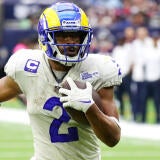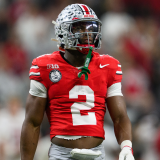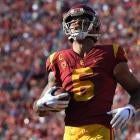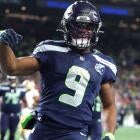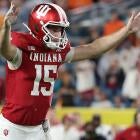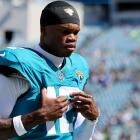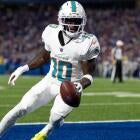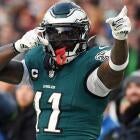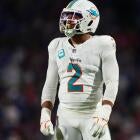
What the Colts didn't do in the NFL draft, and one thing they definitely got right
The Colts failed to address their pass rush, but filled plenty of other needs to make a playoff return
The Indianapolis Colts made sure they improved their offense this offseason and that carried over into the 2020 NFL Draft. The offensive retooling began with the free agent acquisition of Philip Rivers at quarterback. Indianapolis didn't have a first-round pick in the 2020 NFL Draft, but they potentially added two starters on Day 2 with wide receiver Michael Pittman and running back Jonathan Taylor. One of the Colts' biggest draft needs was adding a wide receiver to complement T.Y. Hilton and Indianapolis wasted no time with the selection of Pittman at No. 34 overall. Pittman should slot right in as the No. 2 receiver and a big-body target for Rivers on the outside.
The selection of Taylor was a bit surprising because the Colts have incumbent starting running back Marlon Mack (who had 1,091 yards and eight touchdowns last season), but Mack is in the final year of his rookie contract and is due for an extension. And more importantly, Mack has battled nagging injuries throughout his Colts career. Whether the Colts sign Mack to an extension remains to be seen, but Indianapolis has a legitimate 1-2 punch with Mack and Taylor in 2020.
Pittman and Taylor were all the Colts needed to complete their offense at the skill positions. If Parris Campbell makes strides in year two, the Colts will have a dangerous wide receiver group with Hilton, Pittman, Campbell, Zach Pascal and Marcus Johnson. Let's not forget the two-tight end set of Jack Doyle and Trey Burton.
Indianapolis is set at the skill positions, but let's take a look at what the Colts failed to address in the draft. Addressing these issues before Week 1 could make Indianapolis a favorite for the AFC South crown.
1. Pass rush remains the same
The Colts passed on adding a pass rusher in the draft, which may come back to bite them unless they choose to add someone in the free agent market. Indianapolis had just 41 sacks last season (tied for 15th in the NFL) and they are set on one edge with Justin Houston. If the Colts are heading into the season with Kemoko Turay, that's fine -- but there isn't much depth behind either of them.
Fortunately, the free agent market is loaded with edge rushers. The Colts can address this area quickly with one of the top edge rushers available in Jadeveon Clowney and Everson Griffen or choose to add quality depth with Ezekiel Ansah or Michael Bennett. Perhaps Indianapolis brings Jabaal Sheard back.
The Colts have enough cap space ($24.2 million, per Over the Cap) to make a major move if needed. They can still improve here.
2. Passing on an OT
This was another surprising decision by the Colts, especially considering veteran left tackle Anthony Castonzo contemplated retirement earlier this offseason. While the Colts have Castonzo for two more years, this was an opportunity to find and develop a quality backup in 2020 -- who could eventually be Castonzo's successor. The Colts have Braden Smith entrenched at right tackle, but does Indianapolis really want Chaz Green or Le'Raven Clark as the top options if Castonzo goes down?
Danny Pinter was a great pick, even though he projects as a guard in the NFL. Maybe the Colts plan on developing him at tackle, even though he needs to get stronger.
Perhaps the Colts can develop Alberta's Carter O'Donnell (who they signed as an unrestricted free agent) over the next two years. Indianapolis should look into the free agent tackles still remaining in case Castonzo or Smith go down. Cordy Glenn and Jason Peters are probably looking for starting jobs, but both would be excellent backups. Marshall Newhouse would also be a solid addition as a swing tackle.
3. Outside CB depth
The Colts are set with their starting cornerbacks, with Xavier Rhodes and Rock Ya-Sin on the outside and Kenny Moore in the slot. Behind those three, Indianapolis has Marvell Tell and T.J. Carrie. They are fine pieces, but Indianapolis may be in trouble if they have to play significant playing time.
What happens if Moore goes down for a significant amount of time (he missed five games last season)? The Colts did draft Isaiah Rodgers to cover that ground, but counting on him in year one is a stretch.
If Moore stays healthy and Ya-Sin improves in year two, this isn't a problem. Rhodes had a poor year in 2019 (opposing quarterbacks had a 123.8 passer rating targeting him; don't let the Pro Bowl appearance fool you), so Indianapolis has to hope he comes close to his 2016-to-2018 level of play.
Adding a veteran cornerback isn't the worst thing in the world for Indianapolis. They're covered (literally) in the slot, but the outside cornerback spot could use some insurance.


